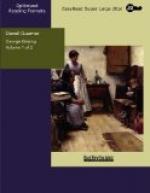Ivy looked up with wonder in her gentle, dreamy eyes.
“It must be very strange.”
“I have thought about it, and I believe it comes from ignorance. You know, perhaps what I said and did wasn’t really wrong, after all— if one only understood.”
The listener was puzzled.
“But we won’t talk about it. Before long I shall understand so many things, and then you shall have the benefit of my experience. I believe I am going to be very happy.”
It was said as if on a sudden impulse, with a tremulous movement of the body.
“I hope and believe so, dear,” replied the other, warmly.
“And you—I don’t like to think of you being so much alone. There’s a piece of advice I should like to give you. Try and make friends with Mrs. Quarrier.”
“Mrs. Quarrier?”
“Yes—I have a good reason—I think she would suit you exactly. I had a long talk with her about a fortnight ago, and she seemed to me very nice—nicer than any one I have ever known, except you.”
“Perhaps I shall have an opportunity”——
“Make one. Go and see her, and ask her to come and see you.”
They fell again into musing, and the rest of their talk was mainly about the arrangements for the morrow.
About the time that Ivy Glazzard was going home, her uncle left Polterham by train. He travelled some thirty miles, and alighted at a large station, which, even thus late, was full of noise and bustle. After drinking a cup of coffee in the refreshment-room, he crossed to another platform, and then paced up and down for a quarter of an hour, until the ringing of a bell gave notice that a train which he awaited was just arriving. It steamed into the station, and Glazzard’s eye, searching among the passengers who got out, quickly recognized a tall, thin figure.
“So, here you are,” he said, holding his hand to Northway, who smiled doubtfully, and peered at him with sleepy eyes. “I have a room at the station hotel—come along.”
They were presently at their ease in a sitting-room, with a hot supper on the table. Northway ate heartily; his entertainer with less gusto, though he looked in excellent spirits, and talked much of the impending elections. The meal dismissed, Glazzard lit a cigar (Northway did not smoke) and broached the topic of their meeting.
“Now, what I am going to propose to you may seem disagreeable. I take it for granted that we deal honourably—for my own purpose is nothing to be ashamed of; and if, after hearing what I ask, you don’t care to undertake it, say so at once, and there’s no harm done.”
“Well, let me know what it is?” replied the other, plucking at his throat.
“Plainly then, I am engaged in election work. My motives are political.”
“Oh!”
“The man of whom we spoke the other day is standing as candidate for a borough not very far from here—not this town. Not long ago I discovered that secret of his private life. I am going to use it against him—to floor him with this disgrace. You understand?”




